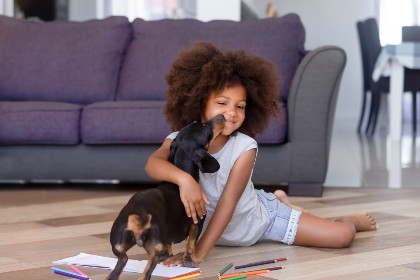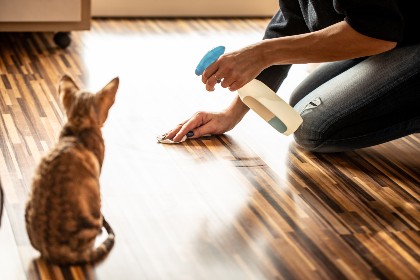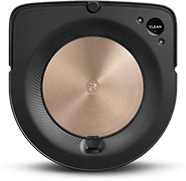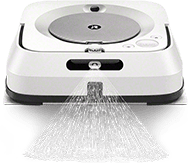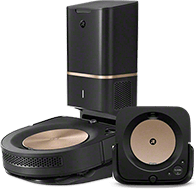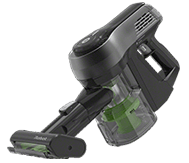7 Best Hardwood Floor Cleaners for Eco-Friendly Families
You tried this cleaner and that wood cleaner and then another and all you’re left with is streaks on the floors, waxiness, or even a stickiness under your feet. Ah, we all know that tacky slurp, the subtle suction noise…
Sometimes you may even find the perfect cleaner, for a while, until your floors become dingy over time and no amount of cleaning ever seems to bring them back to a pristine shine.
So what do you do?
Well, we know a thing or two about cleaning various types of flooring. We have a few insights to share on the best hardwood floor cleaners for your lifestyle and flooring type.
Which types of cleaning products are right for your floors?
It’s really tricky to tell, honestly. As mentioned, it can seem like you’ve found the perfect cleaner until months later, when your floor’s dinge just won’t come up or they’re consistently cloudy when they weren’t before.
Why does this happen?
Because most floor cleaners have a bit of wax in them. This gives your floors an incredible shine… for a while. But it all continues to build up on your floors. If you don’t actively remove that buildup every 6 months to a year, you’ll likely face floor dulling.
Don’t let that deter you from getting a good clean, because there are plenty of great options.
1. Bona® Hardwood Floor Cleaner
Bona® hardwood floor cleaner is always one of our top picks of floor cleaning solutions because it’s ph-neutral, yet highly effective at both cleaning your floors and making them shine.
Why Bona® is the absolute best for all hard floors
The secret is really in that pH balance. Most floors don’t actually need intense chemicals to be clean.
The planks themselves are sealed – even when they’re vinyl, linoleum, or laminate flooring– with a waxy finish, making them impervious to staining, spills, and dirt.
(The above depends on the type of hardwood flooring you have and how well they’re maintained. Some floors may need to be resealed yearly to avoid damage over time from grit and dirt. Check with your flooring manufacturer for care and maintenance recommendations.)
In other words, they generally don’t need much more than water or a pH-neutral solution. Using anything more may actually damage that waxy finish and make your floors more vulnerable over time.
Bona® Floor Cleaner. Specifically made for your hard-surface floor.
EPA certified
Six Bona® floor care products have been granted the Safer Choice Certification by the Environmental Protection Agency (EPA).
What does this mean exactly?
It means they don’t contain formaldehyde, phthalates, phosphates, parabens, or ammonia and instead are made with water-based, biodegradable, and plant-derived ingredients.
We’ve all been in a tight room while using heavy-duty cleaning chemicals before, and we’ve all had to step out of that room coughing, holding our breath, or holding our head as the dizzy headache waves over us (okay, maybe you’ve avoided that so far. Brownie points if you have.)
No one wants to breathe in those harsh chemicals, so finding a hardwood or laminate floor cleaner that is both safe and effective as well as environmentally friendly is a welcomed choice.
Child & pet-friendly cleaning solutions
Kids crawl and play on the floor (they may even lick the floor once or twice… or a dozen times. They certainly pick up toys from the floor and put those in their mouths). Your pets, well, they aren’t much better than your children.
It’s hard to feel good about what they’re eating off the floor as it is, but when you’re using chemicals to clean, it might warrant a search for something safer.
Luckily, there are some easy solutions to this.
Best all-natural ingredients to clean hardwood floors
Your floors see bare feet, shoes tracking in God-knows-what, slobber from the dog and your children, dropped cheerios and spaghetti sauce… we can go on.
Because of that, you might think you need harsh chemicals, but you’re not cleaning grout. You can really get a great clean with some simple, natural ingredients such as:
- Water
- Vinegar
- Baking soda
- Lemon or orange
- Dish soap
- Essential oils
You can use all of these incredible ingredients on their own, or in combination with each other.
One of the most common mixtures is vinegar and one or two of the above.
Best DIY hardwood floor cleaning solutions
In most cases, you can get away with just using water to quickly clean your hardwood floors, especially if you clean them regularly and they aren’t in a highly trafficked area.
Again, this is because they have that waxy sealant that keeps them from truly getting dirty.
But if you have heavily tracked floors (or they haven’t been sealed in a while) and you have to clean up bigger messes on the regular, you may need a little bit of assistance with a few key ingredients.
Get your hardwood floors eat-off-the-floor clean.
2. Vinegar+
The most common ingredient that most people use as a base is vinegar. Not only for its cleaning power but for its natural versatility as a cleaner.
Vinegar’s secret is that it’s made from acetic acid, which is often used as an ingredient in other household cleaners you’d buy in the store.
Acetic acid is an effective cleaner that can attack and dissolve grease and grime, and even bacteria that build up on your hard surfaces– but for this purpose, on your floors.
You don’t even have to stick with just white vinegar, either. You can use apple cider vinegar or red wine vinegar if you want to (or if you prefer those smells over white vinegar). They all contain the same powerful cleaning agent of acetic acid.
Oh, and if the vinegar smell does really put you off, don’t fret. That smell will only linger for about an hour (and possibly less depending on how diluted it is or the other ingredients you blend it with. Essential oils can really help to add that fresh clean scent.)
Why vinegar may be a good choice
When vinegar interacts with the organic chemicals in stains, grease, and grime, it reacts (a chemical reaction) for effective stain removal.
To use vinegar as a cleaner, dilute it with either water or water and another natural ingredient.
3. Vinegar + water
You generally want to get any vinegar solution down to about 5% acidity, which means you can use a fair amount of water without losing the cleaning property of the vinegar.
4. Vinegar + water + baking soda
If you want to boost the cleaning power of your vinegar for a tougher job– such as scouring a sticky mess or lifting a stain (such as one left under a rug or floor mat, or maybe behind your refrigerator) — add baking soda to the mixture.
Baking soda is technically neutral, but since it does have a slight pH it’s also basic, which is why it’s such a good cleaner (and odor neutralizer).
Most stains, grease, and grime (as well as odors) are acidic.
It’s also a great abrasive because it’s much finer than most other abrasive materials or cleaners, and doesn’t rely on chemicals to remove and lift stains and grime.
Pairing baking soda with vinegar only seems like a natural combination considering their individual powers for cleaning. The acid and base chemical reaction works to lift grime and stains easily, making it one of the best cleaners you can get your hands on.
5. Vinegar + water + essential oils
Say you don’t need the abrasive baking soda, and really just need a quick clean. Vinegar and water are all you really need.
But, if you want to add a little flavor (for your nose, not your mouth), then add essential oils. A single drop of your favorite essential oils can make all the difference in masking the harsher scent of vinegar, but feel free to add as much as you’re comfortable using.
And while any essential oil scent will do, there are a couple of tried-and-true choices, and some may even add some cleaning power.
Some of the most common essential oils to combine with vinegar include:
- Lavender
- Orange
- Lemon
- Bergamot
- Eucalyptus
- Tea Tree
- Peppermint
- Frankincense
- Almond scent
Among those, tea tree oil is one of the best for use in cleaning solutions because it is a natural cleanser and air purifier.
6. Vinegar + water + lemon juice
You may think it’s a little counterintuitive to clean your wood surfaces with food, but lemon juice is one of the best natural surface cleaners around.
Why?
Because it’s high in citric acid, yet has a relatively low pH, as well as some antibacterial properties (thanks to the acid).
The citric acid is great for cutting through grime and other acids on its own (and smells amazing doing it), but when paired with alkaline, the chemical reaction can boost cleaning power even more.
But lemon juice doesn’t stop there…
Like baking soda, lemons neutralize odors because many smells are either alkaline or acidic (they cancel each other out).
7. Vinegar + water + dishwashing liquid
Dishwashing detergent (generally the liquid you keep next to your kitchen sink), is designed to fight grease, eliminate grime, and cut through hard, crusty messes (and smell great too- sensing a theme… who doesn’t like nice clean smells?)
But you don’t have to limit your dish soap to just your dishes and sink. It’s an excellent cleaner for multiple surfaces (and even the hard oil stains on your clothing. But that’s another story).
The secret ingredient that makes dishwashing liquid the boss cleaner for greasy messes everywhere… surfactants (exciting, right?)
Your entire house should feel fresh.
These cleaning hacks will get you there.
3 best hardwood floor cleaning tools
The first items that might jump to your mind when you think floor cleaning might be a broom and a mop. Simple, right?
But those really aren’t your only options, and in fact, you might even be using the wrong mop.
A mop is a mop is a mop… so you might think. But some flooring manufacturers and cleaning experts know there’s a difference.
Traditional rope mops– those that you have to twist in a bucket of water (and require a lot of rinsing and ringing)– hold too much water for most hardwood floors.
You may think you’re taking up that water when you swipe over it again, but there’s generally a film of water left to dry on your flooring.
Your floor’s finish can protect your floor from minimal amounts of water, but the longer it sits on the surface, the riskier it is. If your finish is a little worn, or you haven’t sealed your floors in a while, the water seeps into the spacing between the planks and well… water and wood don’t mix.
The best mop is one that cleans thoroughly with the least amount of water or cleaning solution, and that wicks up the water as fast as possible.
For most uses, this means something like a microfiber cloth pad that attaches to your mop and that you can toss in the laundry after use.
A mop? That’s so 2004!
Let the Braava jet® m6 Robot Mop clean for you.
1. Spray bottle and microfiber cloth
It sounds a little unorthodox to use a spray bottle to clean your floors (though there’s gotta be someone that’s been doing this since 1940… or somewhere around there), but the spray bottle is the new mop bucket.
Hear us out now…
We already made the point that the more water on your floors the more damage you’re opening them up for. If that water seeps in and your floors aren’t as protected as you think they are, you’ll see them warp and bubble and gap over time.
By using a spray bottle, you’re evenly coating your floors with just enough cleaning solution to get up the grime and dirt, without saturating your floorboards.
Microfiber cloths are gentle and absorbent, so they won’t scratch or scuff the wax finish on your flooring (even micro-abrasions wear on your flooring over time). They’ll also retain a lot of the moisture needed to clean your floors without leaving much on your floors.
2. Roomba® robot vacuum
Of course, we’ve gotta talk a little about ourselves here, because hey… we know floor cleaning, and you came here just for that.
You might think a Roomba® robot vacuum works best for cleaning your area rugs and carpets, but it’s just as intuitive when it comes to cleaning your hardwood floors.
Known for its ease of use, a Roomba® robot vacuum eliminates the need for constant sweeping– which is an essential first step before mopping.
Seriously. Don’t miss this step.
If you do, when you mop, you’re just pushing around grainy dirt that will more easily settle into the pores and minuscule scratches (and even make minuscule scratches) to make your floors look dingy (and it’ll be hard to get them clean again without scrubbing or sanding).
Since our robot vacuums are cordless, intuitive, built with dirt sensors, and utilize machine learning to recognize your living patterns, it’ll know the perfect time to clean spaces like your kitchen (and recognize your high-traffic areas).
3. Braava® robot mop***
So you know you need to sweep before you mop, and you know that the best product is one that doesn’t leave much water behind (like a microfiber cloth mop), but do you know your Braava® robot mop can sync with your Roomba® robot vacuum to do both?
When synced, your Braava® can follow the same path or cleaning pattern as your Roomba®, ensuring it’s never mopping an area that still has dirt and debris in the way.
Even better? Your Braava® robot mop can use Bona® Hard-Surface Floor Cleaner!
4. Roomba Combo™ j7+ Robot Vacuum and Mop***
It’s here! The first of its kind, 2-in-1 vacuum/mop combo. This combo has a fully retractable mop that senses when a carpet or rug is nearby.
So go ahead, vacuum, then mop… mop, then vacuum! Get the best of both worlds. Effortlessly maintain clean and tidy floors with one, programmable tool.
Your life just got easier.
Roomba Combo™ j7+ Robot Vacuum and Mop.
Best hardwood floor polish
For some, a simple and quick mopping job is enough to feel your floors are clean. For others, polish is a must to get that perfect glossy shine.
But glimmering floors aren’t the only reason to use floor polish after mopping.
A good floor polish can protect your floors from damage– such as scratches from shoes, furniture, and dropped silverware– over time as well as fill scratches that are already there.
That said, what’s the best hardwood floor polish you can use?
Bona® hardwood floor polish
We’ve mentioned Bona® floor cleaner, and we’d be remiss if we didn’t include Bona® floor polish as well.
It’s not just because Bona® floor cleaner and polish work well with our robot vacuums and mops, but Bona® floor polish actually works without building up a terrible wax finish on your floors.
We’ve heard some horror stories about floor polish having to be professionally removed after years of cloudy buildup.
But with Bona®, we’ve heard customers rave about floors with a 50-year-old finish looking brand new again.
Part of its secret is that it’s antimicrobial, meaning it’ll protect your floors from bacteria and mildew that could seep into your wood planks and leave cloudiness on your floors.
Even better, it’s GREENGUARD certified, so it’s environmentally friendly and safe to use.
FAQ
What ingredients are safe to use on polyurethane-finished floors?
Most traditional real-wood hardwood floors are finished with a thick layer of polyurethane, which acts as a protective finish, defending your floors against the harsh scratches of dog claws and dropped knives.
But these days, most people don’t install real wood floorboards. You’re lucky if you find them in an old home, under a layer of ugly green carpet…
Today, most people install vinyl, linoleum, or laminate over real wood.
Real wood is expensive, you could build a rocket for a moon landing for the same price as installing hardwood in your living room (kidding… kind of).
So that begs the question:
What should you clean vinyl, linoleum, and laminate hardwood floors with?
It’s always best to consult with your flooring manufacturer before you choose a cleaner for your flooring.
Some have stipulations in the warranty, voiding it if you use products like vinegar or a steam mop.
(Steam cleaners use excessive heat to disinfect floors, which isn’t always recommended for certain types of flooring and finishes. Remember, vinyl floors are a type of plastic.)
That said, all of the cleaning concoctions we’ve mentioned in this article (all the vinegar mixtures), as well as Bona®, can be used to clean most hardwood floors.
Why cleaning hardwood floors with harsh chemicals is a no-no.
It’s safe to say that cleaning most things with harsh chemicals isn’t ideal unless it’s such a challenging mess that nothing but a shovel, some steel wool, and some flesh-eating chemicals will get rid of it.
Okay, that’s a little dramatic, but you get the picture.
Here’s the thing with hardwood floors– whether they’re real wood or some variation of vinyl or laminate– they’re trafficked a lot.
At least most floors are.
This leaves them open to constant dirt (and crushed cheerios), whether we can see it or not.
Under our feet, our furniture, and even under the bristles of our brooms, those dirt particles make tiny scratches in the floor’s finish.
Water and any chemical we use from then on seep into those tiny scratches. Maybe they’ll make it to the wood, or maybe there’s some finish left to protect the wood or vinyl layers.
But just because it’s plastic doesn’t mean it’s impervious to damage from water and chemicals.
Some cleaners are specially formulated with this in mind, like Bona®, and some natural ingredients are delicate enough on these surfaces to avoid damage.
The harsher the ingredients though, the more you have to be aware of how your floors react over time.
What do fragrances do to hardwood?
While there are plenty of safe, amazing smells to use on your floors, some fragrances, perfumes within floor cleaners, and even essential oils have the potential for wearing away a finish on hardwood floors.
This is because perfumes and some essential oils contain alcohol (unless the essential oils are cold-pressed or steam distilled).
Alcohol is generally a risk for hardwood floor finishes (think of how you use rubbing alcohol to remove goo and glue from surfaces, or your skin… it can have a similar effect on your floors over time).
Another caveat is that many essential oils don’t blend well with water (just like cooking oil doesn’t blend with water).
Using only essential oils with water (without vinegar to blend them), you’re just spraying droplets of essential oils onto your floors.
Some essential oils can leave droplet marks on your floor’s finish (depending on the essential oil and the type of flooring/ finish).
How do I deep-clean hardwood floors?
For real hardwood floors, most messes should be spot cleaned rather than lathered in water and cleaner.
Remember that floorboards shrink and expand with the seasons, and if your floors aren’t resealed regularly, you run the risk of getting water between the planks and damaging the wood.
Beyond spot cleaning, there is a process for keeping your floors as clean as possible without damage:
1. Sweep first
Even when it doesn’t look as though there is dirt and debris on your floors, you should always sweep them before you mop.
Tiny grains of dirt scratch your floor’s finish, wearing them down over time and leaving them vulnerable to water and chemicals during future cleanings.
Also to keep in mind– even if you have vinyl or laminate, your planks can shift under foot pressure or with the natural settling of your home. They’ll also shift if dirt gets between the planks and creates a wedge driving the pieces apart (also leaving them more susceptible to water damage).
2. Spray your hardwood floors with Bona® or a natural cleaning solution like vinegar with water and essential oils
Instead of soaking your floors, add your cleaning solution to a spray bottle and spray only the section you’re about to clean rather than soaking your floors with a ton of water.
There are some great microfiber mops with a cartridge that holds your cleaning solution (aka a spray mop) and a trigger in the handle to activate the spray.
These mops add fresh solution to each section before you run the pad over them, and the microfiber pad ensures you’re not keeping your floors too wet for too long.
3. Use a dry microfiber cloth or dry cloth mop pads after you mop to get up any excess water and cleaning solution.
The more conscious you are about drying your floors, the better.
4. Use a dryer sheet and extender brush with your cleaning solution to clean your baseboards as well.
The dryer sheets work with static electricity to lift dust, but they also coat your baseboards in a fabric softener that keeps dust and dirt from building up as well.
An extender brush (like a feather dust mop) or your wet mop makes it easier to clean your baseboards without getting down on your knees to scrub (and if you do this with your regular cleaning, you’ll never have to scrub again).
With a Roomba® robot vacuum and a Braava® robot mop, or Roomba Combo™ j7+ Robot Vacuum and Mop, you don’t have to do either step.
You can simply program them to clean your hardwood floors at certain times of the day (or let them learn your routine to program themselves), and they’ll take care of the sweeping and mopping.
Our Roomba® robot vacuum cleaners are gentle on your floors and pick up debris and dirt before they can embed in scratches and between planks. Our Braava® robot mop sprays just the right amount of cleaning solution and wicks it up fast for an effective clean without leaving the solution behind— a streak-free shine, as you might say.
***Disclaimer: Besides water, Bona® Floor Cleaner is the only cleaner recommended for use in iRobot robot mops. ***
Up next, read how to clean your floors without damaging them, with one of these blogs:

